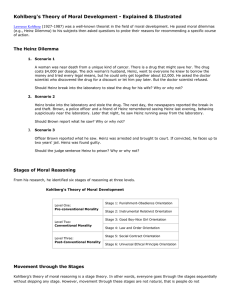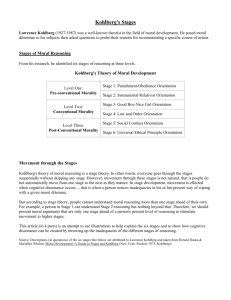Kohlberg Famous Moral Dilemma - Windsor C
advertisement
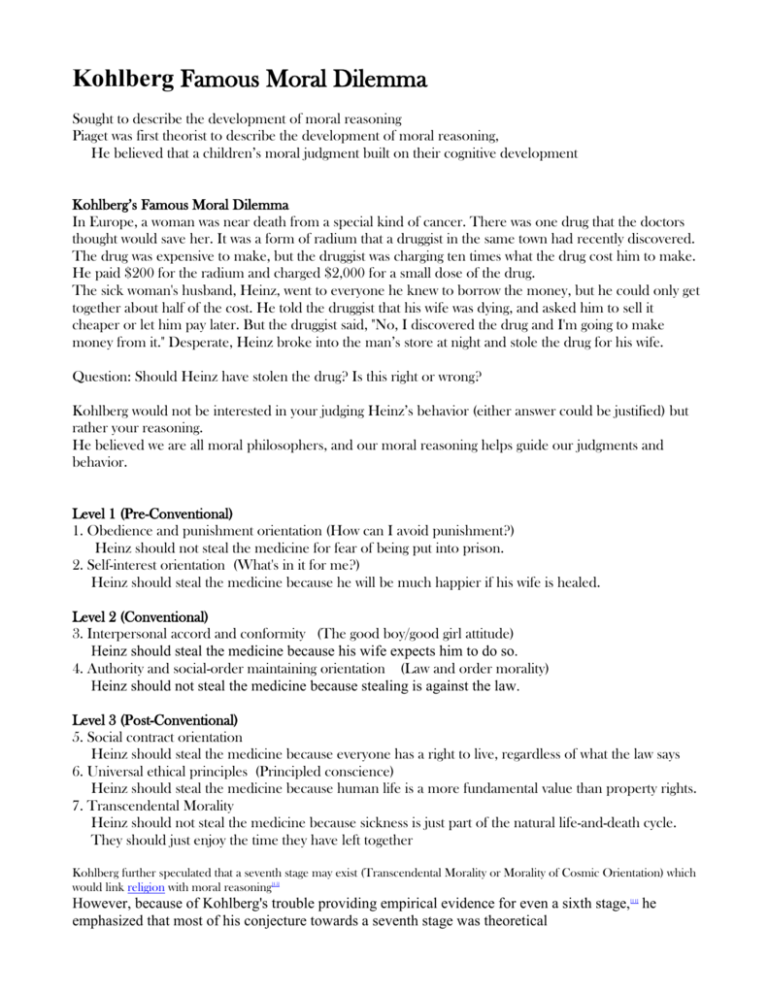
Kohlberg Famous Moral Dilemma Sought to describe the development of moral reasoning Piaget was first theorist to describe the development of moral reasoning, He believed that a children’s moral judgment built on their cognitive development Kohlberg’s Famous Moral Dilemma In Europe, a woman was near death from a special kind of cancer. There was one drug that the doctors thought would save her. It was a form of radium that a druggist in the same town had recently discovered. The drug was expensive to make, but the druggist was charging ten times what the drug cost him to make. He paid $200 for the radium and charged $2,000 for a small dose of the drug. The sick woman's husband, Heinz, went to everyone he knew to borrow the money, but he could only get together about half of the cost. He told the druggist that his wife was dying, and asked him to sell it cheaper or let him pay later. But the druggist said, "No, I discovered the drug and I'm going to make money from it." Desperate, Heinz broke into the man’s store at night and stole the drug for his wife. Question: Should Heinz have stolen the drug? Is this right or wrong? Kohlberg would not be interested in your judging Heinz’s behavior (either answer could be justified) but rather your reasoning. He believed we are all moral philosophers, and our moral reasoning helps guide our judgments and behavior. Level 1 (Pre-Conventional) 1. Obedience and punishment orientation (How can I avoid punishment?) Heinz should not steal the medicine for fear of being put into prison. 2. Self-interest orientation (What's in it for me?) Heinz should steal the medicine because he will be much happier if his wife is healed. Level 2 (Conventional) 3. Interpersonal accord and conformity (The good boy/good girl attitude) Heinz should steal the medicine because his wife expects him to do so. 4. Authority and social-order maintaining orientation (Law and order morality) Heinz should not steal the medicine because stealing is against the law. Level 3 (Post-Conventional) 5. Social contract orientation Heinz should steal the medicine because everyone has a right to live, regardless of what the law says 6. Universal ethical principles (Principled conscience) Heinz should steal the medicine because human life is a more fundamental value than property rights. 7. Transcendental Morality Heinz should not steal the medicine because sickness is just part of the natural life-and-death cycle. They should just enjoy the time they have left together Kohlberg further speculated that a seventh stage may exist (Transcendental Morality or Morality of Cosmic Orientation) which would link religion with moral reasoning [15] However, because of Kohlberg's trouble providing empirical evidence for even a sixth stage, he emphasized that most of his conjecture towards a seventh stage was theoretical [11] High School Example Stage 1 Teacher has latecomers do 50 pushups in front of the class. Stage 2 Group of students involved in a cooperative learning activity get upset because one of their group members is repeatedly absent and did not do any work. Stage 3 Student writes in her journal "I am going to work harder in school so I won't let you down because if you think I can make it then I can make it." Stage 4 "Move carefully in the halls." This rule is to protect the health and welfare of the students. Stage 5 (Example for a handout in a high school class) "Please remember that this is your room and your class. The behavior and participation of each person will shape the type of learning that will occur. Since one person's behavior affects everyone else. I request that everyone in the class be responsible for classroom management. To ensure that our rights are protected and upheld, the following laws have been established for this classroom...." Stage 6 Teacher: "I will not tolerate any racial, ethnic, or sexual slurs in this classroom. In this room, everyone is entitled to equal dignity as a human being." (Hinman) Social Intuitionist Account of Morality The mind makes moral judgments as it makes visual judgments – quickly and automatically We feel disgust when seeing people engaged in degrading acts Could human morality be run by moral emotions? Do moral feeling come before moral reasoning? Example 1 Imagine a runaway trolley heading for five people. All will die unless you throw a switch that diverts the trolley to another track, where it will kill one person. Should you throw the switch? Example 2 Imagine the same dilemma, except that the only chance you have to save the people is to throw a stranger in front of the trolley, where he body will stop the trolley. The logic is the same, but most people say No to example 2 In a lab test, only when participants were given the second example did their brain’s emotion areas light up. Despite the identical logic (Kill one, save five) the personal dilemma engaged emotions that altered moral judgment. So moral judgment is THINKING and FEELING
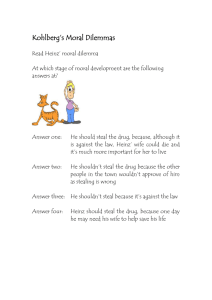
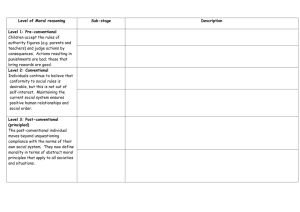
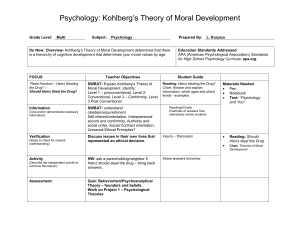
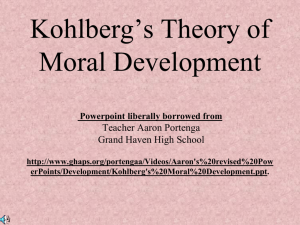
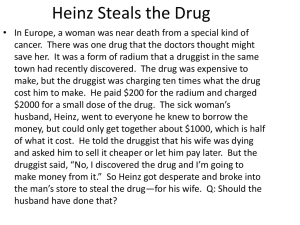
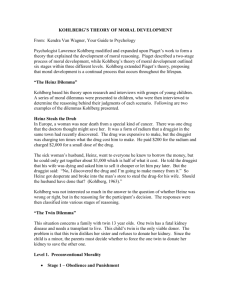
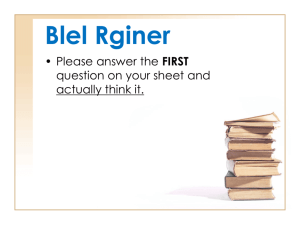
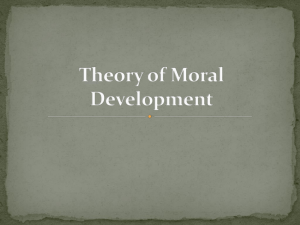
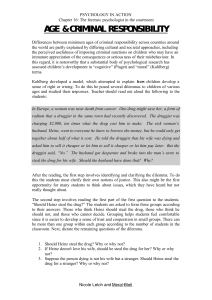

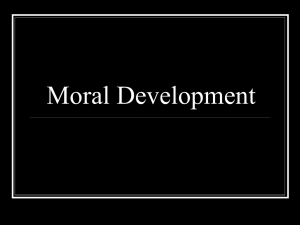
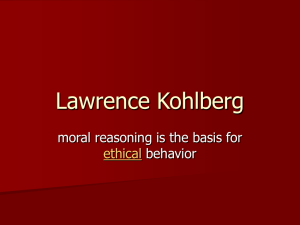
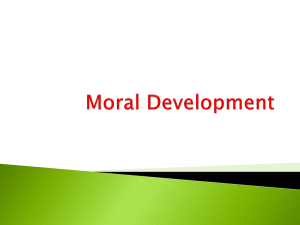
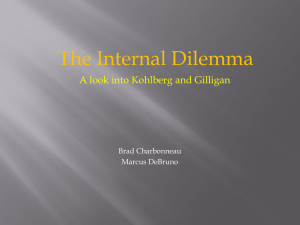
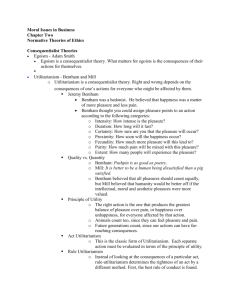
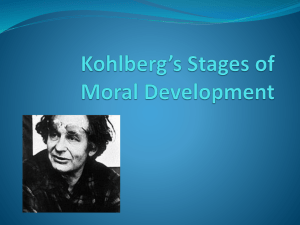
![Kohlberg Stages of Moral Development[1]](http://s3.studylib.net/store/data/009417269_1-2954bc9e517b833986f053ee60123345-300x300.png)
